

Fountas & Pinnell's Continuum of Learning. Reading Workshop Videos. Challenging Advanced Readers. The Literacy Teacher's Playbook- Jennifer Serravallo. 6 Alternatives to Reading Logs by @shfarnsworth. Guest blog post by Shaelynn Farnsworth Let’s face it, reading logs are typically not accurate in time read or books finished.
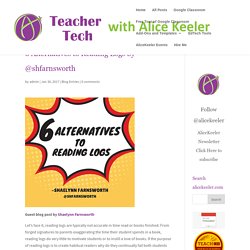
From forged signatures to parents exaggerating the time their student spends in a book, reading logs do very little to motivate students or to instill a love of books. If the purpose of reading logs is to create habitual readers why do they continually fail both students and teachers? What alternatives to tracking pages or time offer more value and choice to readers? 1. Have students share what they read on social media. 2. Book blogs provide students a social experience of sharing what they read with a global audience. 3. Along with Book Blogs, students can create Vlogs sharing what they read. 4. As adults, when we read something that we enjoy we talk about it. 5. Give Me 5 is a simple strategy where students choose 5 quotes from the book that best illustrate the author’s message, insight into a character, or conceptual understanding. 6.
Shaelynn Farnsworth. The Importance of the Classroom Library. Assessment in My Reading Workshop. The Reading & Writing Project - Reading and Writing Performance Assessments. If you are experiencing difficulties viewing the PDF documents below we recommend that you download Foxit PDF Reader.
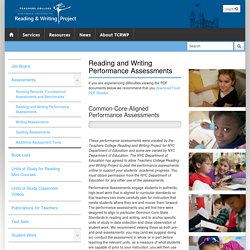
Common-Core-Aligned Performance Assessments These performance assessments were created by the Teachers College Reading and Writing Project for NYC Department of Education and some are owned by NYC Department of Education. The NYC Department of Education has agreed to allow Teachers College Reading and Writing Project to post the performance assessments online to support your students' academic progress. You must obtain permission from the NYC Department of Education for any other use of the assessments. Performance Assessments engage students in authentic, high-level work that is aligned to curricular standards so that teachers can more carefully plan for instruction that meets students where they are and moves them forward. In the case of the second grade assessment, children will study nonfiction reading and informational book writing as two separate but related units. On Reading Logs. I write this post not to shun, not to rage, and not to put down.
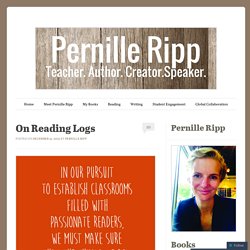
I write this post not to say what is right or wrong, but instead to add a little tiny piece to the ongoing discussion of where reading logs may or may not fit into our classrooms. Of the damage and the usefulness of reading logs. This is not a post with absolutes, or at least, I don’t think it will be. The Classroom Library & Independent Reading. Humanities Meeting Dec 2015- Assessment in RW. KLL Burger Poster Letter. Reader's Workshop. What is Reader's Workshop? Reader's Workshop provides students with a supportive environment that involves them in authentic reading experiences that focus on the strengths and needs of each individual student. Reader's Workshop helps kids develop strong reading skills through the use of a mini-lesson, shared reading, read aloud, conferencing, independent reading, paired reading, literature response, and Reader's Chair.
Nonfiction, Readers Workshop and Reading Strategies. Literacy / First 20 Days - Launching Reading Workshop. Readers' Workshop K-6 - Minilessons. Planning for Daily Intentional TeachingWhat do my students need to know?
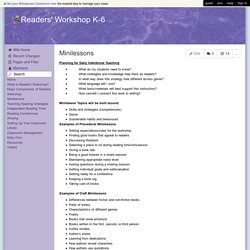
What strategies and knowledge help them as readers? In what way does this strategy look different across genre? What language will I use? Reader's Workshop. This website is designed and maintained by Karen A.
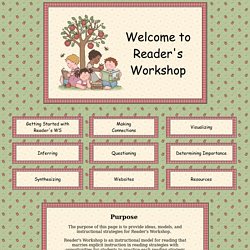
McDavid © 2004. Ideas, content, activities, and documents for this website are copyrighted by Karen A. McDavid and should not be copied or downloaded without permission. All graphics seen throughout this website should not be removed, copied, or downloaded. You may download the banner below with a link back to this site. Graphics by. Reading Workshop: What It Looks Like in My Classroom. Serravallo StudyGuide. Reading Workshop Info parent presentation. Reading Workshop - Information, ideas, and resources from Busy Teacher's Cafe. Reader's Workshop.org. Interactive Read Aloud: How To Do It and Why It Works. Every teacher should know how to do an interactive read aloud.
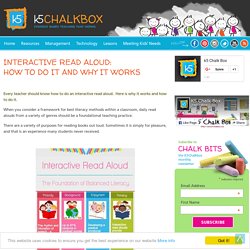
Here is why it works and how to do it. When you consider a framework for best literacy methods within a classroom, daily read alouds from a variety of genres should be a foundational teaching practice. There are a variety of purposes for reading books out loud. Sometimes it is simply for pleasure, and that is an experience many students never received. Other purposes can include: develop background knowledge necessary for understanding a topictarget vocabulary developmentdemonstrate prosodylearn how to inference, make judgements and use meta-cognition strategiesintegrate higher order questioning skills set the stage for a unit or lessondevelop connections to a text (text-to-self, world or another text)meet academic content standards at a students frustration level However you choose to use reading aloud to kids, it should be done in a variety of ways across different genres, every single day.
All About Balanced Literacy. Shared Reading is a link in helping students become independent readers.
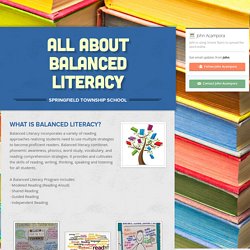
It allows the teacher to model and support students using prediction and confirming skills. It allows less confident students the chance to share stories/articles/poetry in a nonthreatening situation. It focuses on the meaning, fun, enjoyment, characters and sequence of a story and allows them to relate it back to their own experiences. It promotes discussion, problem solving and critical thinking by students. Independent Reading: 101. What is Independent Reading, Really?
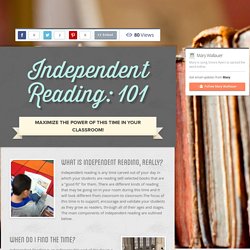
Independent reading is any time carved out of your day in which your students are reading self-selected books that are a "good fit" for them. There are different kinds of reading that may be going on in your room during this time and it will look different from classroom to classroom.The focus of this time is to support, encourage and validate your students as they grow as readers, through all of their ages and stages. The main components of independent reading are outlined below. When do I find the Time? Independent Reading is an indispensable part of the day in a literacy rich classroom.